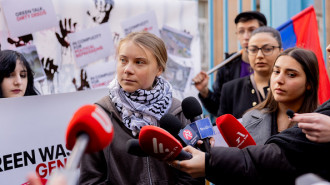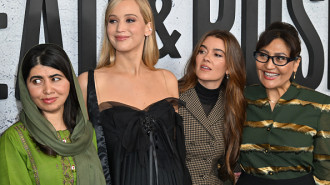Iranian chess referee says she won't return home after hijab row
Iranian chess referee says she won't return home after hijab row
Chess referee Shohreh Bayat is the latest Iranian athlete to mull never returning home over the country's strict codes for sports competitors.
3 min read
Bayat says she does not support wearing the hijab [Getty]
An Iranian chess referree who was accused of violating the Islamic Republic's dress code while judging a match away from home says she does not want to return from Russia out of fears for her safety.
Shohreh Bayat has said she will not travel back to Iran unless the country's chess federation guarantees her security.
The chess referee faced a backlash at home after Iranian state media criticised her for photos in which she appeared not to be wearing the hijab during the championship's first matches in Shanghai.
All women in Iran are required to wear the headscarf in public. Female athletes are also required to wear it abroad.
Bayat contends that she was wearing the hijab, but that it was loose and could not be seen in some angles.
"Apparently it was not enough for the Iranians," she said.
She has since stopped wearing the hijab altogether, and has also refused to write a public apology as requested by the Iran Chess Federation as she did not want to publicly support the hijab.
"I noticed that they have already condemned me," Bayat said. "I decided not to wear hijab because it won't change anything."
Iranian athletes defect over oppression, Israel boycott
Bayat is not the only Iranian sportwoman to face difficulties over the hijab.
Earlier this month, chess grandmaster Mitra Hejaziour was booted from the national team for not wearing the Islamic headscarf during the World Rapid and Blitz Championship in Russia.
Iran's only female Olympic medalist said earlier this week she had left the Islamic Republic for good, accusing the government of oppressing women and exploiting her athletic success.
"I am one of the millions of oppressed women in Iran who they have been playing with for years," said Kimia Alizadeh, who won the bronze medal in the 57kg category of Taekwondo at the 2016 Olympics.
"They took me wherever they wanted. I wore whatever they said. Every sentence they ordered me to say, I repeated. Whenever they saw fit, they exploited me," she wrote in an Instagram post that accused Tehran of "corruption and lies".
The Taekwondo star said she had fled to Europe but it is not yet clear where she will attempt to claim asylum.
"My troubled spirit does not fit with your dirty economic ties and tight political lobbies. I wish for nothing else than for Taekwondo, safety and for a happy and healthy life," Alizadeh added.
Iranian athletes are also banned from competing against Israelis during international sporting events, with players and teams pulling out of tournaments to avoid facing Israeli competitors.
The Iranian Judo Federation was last year banned indefinitely from taking part in international events over the boycott. Judo is one of Iran's strongest suits in international sport.
Judoka Saeid Mollaei has said he was pressured by Iranian authorities to pull out of the World Judo Championships in Japan last year.
After he refused, Mollaei said he feared for his and his family's safety, and subsequently fled to Germany. He has since acquired Mongolian citizenship.
Last month, Iranian media reported that the country's top-rated chess champion was ready to renounce his citizenship over the ban on competing against Israeli competitors.
Follow us on Twitter and Instagram to stay connected
Shohreh Bayat has said she will not travel back to Iran unless the country's chess federation guarantees her security.
"I really hope they will provide me something to ensure I will be safe if I come back to Iran," Bayat told Reuters. "But if that doesn't happen, I'm just examining my options and considering anything."
Bayat is currently in the far-eastern city of Vladivostock, where she is chief referee at the Women's World Chess Championship.The chess referee faced a backlash at home after Iranian state media criticised her for photos in which she appeared not to be wearing the hijab during the championship's first matches in Shanghai.
All women in Iran are required to wear the headscarf in public. Female athletes are also required to wear it abroad.
Bayat contends that she was wearing the hijab, but that it was loose and could not be seen in some angles.
"Apparently it was not enough for the Iranians," she said.
She has since stopped wearing the hijab altogether, and has also refused to write a public apology as requested by the Iran Chess Federation as she did not want to publicly support the hijab.
"I noticed that they have already condemned me," Bayat said. "I decided not to wear hijab because it won't change anything."
Iranian athletes defect over oppression, Israel boycott
Bayat is not the only Iranian sportwoman to face difficulties over the hijab.
|
|
Earlier this month, chess grandmaster Mitra Hejaziour was booted from the national team for not wearing the Islamic headscarf during the World Rapid and Blitz Championship in Russia.
Iran's only female Olympic medalist said earlier this week she had left the Islamic Republic for good, accusing the government of oppressing women and exploiting her athletic success.
"I am one of the millions of oppressed women in Iran who they have been playing with for years," said Kimia Alizadeh, who won the bronze medal in the 57kg category of Taekwondo at the 2016 Olympics.
"They took me wherever they wanted. I wore whatever they said. Every sentence they ordered me to say, I repeated. Whenever they saw fit, they exploited me," she wrote in an Instagram post that accused Tehran of "corruption and lies".
The Taekwondo star said she had fled to Europe but it is not yet clear where she will attempt to claim asylum.
"My troubled spirit does not fit with your dirty economic ties and tight political lobbies. I wish for nothing else than for Taekwondo, safety and for a happy and healthy life," Alizadeh added.
Iranian athletes are also banned from competing against Israelis during international sporting events, with players and teams pulling out of tournaments to avoid facing Israeli competitors.
The Iranian Judo Federation was last year banned indefinitely from taking part in international events over the boycott. Judo is one of Iran's strongest suits in international sport.
Judoka Saeid Mollaei has said he was pressured by Iranian authorities to pull out of the World Judo Championships in Japan last year.
After he refused, Mollaei said he feared for his and his family's safety, and subsequently fled to Germany. He has since acquired Mongolian citizenship.
Last month, Iranian media reported that the country's top-rated chess champion was ready to renounce his citizenship over the ban on competing against Israeli competitors.
Follow us on Twitter and Instagram to stay connected







 Follow the Middle East's top stories in English at The New Arab on Google News
Follow the Middle East's top stories in English at The New Arab on Google News


